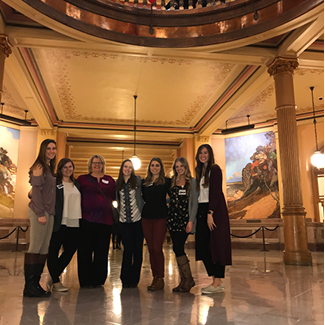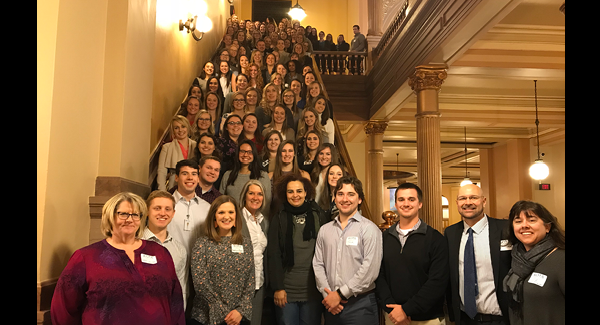Nancy Dahlinger, assistant professor and director of the occupational therapy assistant (OTA) program, accompanied six Newman University students to the Kansas Occupational Therapy Association (KOTA) Day on the Hill in Topeka.
The event was held Feb. 21. Students are given the option to go every year to learn about how government can impact their career field.
More than 80 students, faculty and KOTA staff were in attendance.
In the morning, the group was attended committee meetings, visited each representative’s office and did ergonomic assessments at a booth in the rotunda.

The event lasted one full day and consisted of guest speakers, including Rep. Dan Hawkins, chair of the House health and human services committee, and Senator Barbara Bollier, M.D., vice chair of the Senate public health and welfare committee.
The importance of the day was for students to learn.
Dahlinger said, “We are learning about the telehealth/mental health bill that could have wide-reaching implications for Kansas therapists and KanCare (Medicaid) expansion.”
The Q&A sessions at the end helped students understand where stakeholders’ actions can either support or block legislation.
OTA student Shelby Heathman attended this year because she was not able to last year. “I wanted to see the legislative side of occupational therapy,” she said. “There was a lot of information but it was great to hear first-hand what was a hot topic in the healthcare field. People like to think that things that happen in the capital don’t affect you that closely but it really does. I came away with more understanding of the politics of it all and know now that it is important for me to stay up to date on what is going on. “
Dahlinger was glad students joined the trip so they could see the importance of advocating and increasing awareness of the occupational therapy profession.
She said understanding “how we can help people if the funding for services are supported through various programs (Medicaid, Medicare, licensing) and how state legislation directly affects OTA employment” is important.

